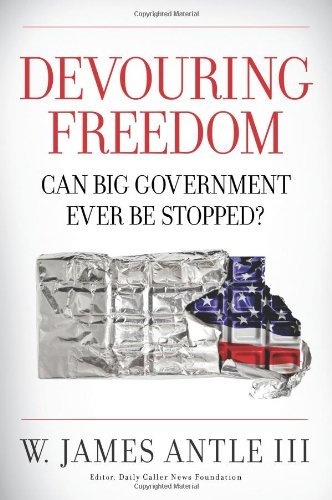This book’s heart is in the right place, but its head needs, as they say, to wrap itself around that heart. Devouring Freedom is substantially a useful history of the spending wars between America’s two main political parties since 1932, culminating in the years since 2009 when Barack Obama became president of the United States. James Antle’s argument that the U.S. deficit should be controlled, the debt and federal spending hugely reduced, and government at every level reined in and brutally cut back is, of course, unanswerable. Antle quotes James Burnham as saying, “If something cannot go on forever, it will stop.” (Surely, he should have attributed the aphorism to Herbert Stein—though it does have the Burnham ring.) A society that lives on borrowed money lives on borrowed time as well.
What Antle seems not to understand is that spending is a symptom, not the cause, of the giantism from which the United States, in company with most of the world’s democracies, suffers. Antle glimpses the truth in a passage in which he refers to the late Andrew Breitbart’s insights regarding “big”—big business, big journalism, big Hollywood, big peace, big government. “It probably wasn’t Breitbart’s intention,” Antle remarks, “but these names illustrate an uncomfortable truth in American politics: all the ‘bigs’ travel together.” They do indeed, which is why Antle’s later assertion that “big government itself . . . was entirely manufactured by the political class” is surprising, as well as naive.
The word manufactured stands out here. The origin of the “bigness” Antle deplores is the activity of the industrial manufacturing class that founded the industrial era two centuries ago, not the machinations of politicians. “Pro-growth conservatism,” Antle says, “is off the table once we become pro-growth for government.” But the connection between economic (meaning, since about 1800, industrial) growth and the growth of the public sector is a reciprocal one. It is equally true that when “we” promote the expansion of government, “we” simultaneously enlarge the capitalist-industrialist sector, chiefly by facilitating the personal and institutional connections (a great many of them venal, dishonest, or illegal) that form as a matter of course between the “private” sector and the “public” one. A pro-business conservative is a pro-capitalist conservative, and capitalism since the Industrial Revolution has meant industrial capitalism: a Bigness beyond all bigness, a bigness that is the sum of all bignesses. Economic conservatives who argue today against big government refuse to see that, as the descendants of laissez-faire industrialists, they and their party had already begun to lose the game decades before Karl Marx published Das Kapital in 1867.
Before economic liberalism, the notion that economy and state are two separate and distinct things was unimaginable. Economic systems were understood to be embedded in, and interwoven with, the wider society in which they functioned. A program as powerful and thoroughly encompassing as industrialism naturally produced a counterforce to oppose and control it, and to protect noneconomic institutions from ruination. Over the past 200 years, the history of the developed world has proceeded by stages. First, the revolutionary industrial system created widespread human misery and began its rapid destruction of the natural world. Second, social liberalism established itself in industrial societies through the passage of regulatory and welfare legislation. Third, the new laws required the expansion of government to execute and fund them—and also, more generally, to serve as a counterweight to the power of the industrial economy. And fourth, industry and government, working against each other at first but increasingly together, in harness, collaborated in creating the contemporary corporate industrial state: the biggest and most powerful institution in history, bigger than the Persian, Chinese, Roman, Ottoman, and British empires. As with his reference to Breitbart, Antle lightly brushes reality when he notes that big labor, big government, and big business are all aspects of the One Big Thing, indicating, perhaps, his unconscious intuition of a truth that, like most mainline conservatives, he really doesn’t wish to wake up to. The need is not to limit the power of government alone, but to limit and securely bind Power—the secular Beast of the Apocalypse and scourge of modernity—itself. It does not seem that the Tea Party, John Boehner, the Republican Party, the Acton Institute, and the Federalist Society, all of them working together and giving it their very best effort, are really equal to the task.
James Antle speculates on Americans’ preference for security and prosperity at the expense of liberty, and vice versa. On this issue the polls are mixed, obviously reflecting, as the NSA scandals demonstrate, the confused ideas, ignorance, and mixed emotions of 310 million people. He does not consider the hold that technological, therapeutic, and materialist thinking and manipulative social therapy have on the imaginations of modern people. The human impulse to be dominated and protected is always at least as strong as the impulse to freedom, a fact that the corporate-industrial behemoth has always been adept at exploiting.
[Devouring Freedom: Can Big Government Ever Be Stopped?, by W. James Antle III
(Washington, D.C.: Regnery) 224 pp., $27.95]

Leave a Reply